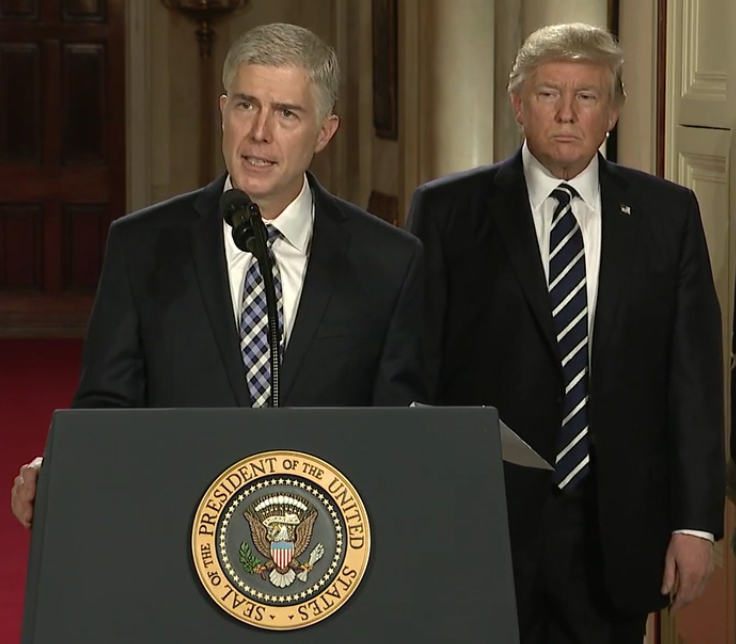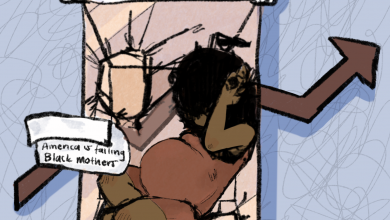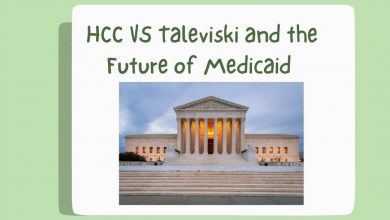Seven Things You Should Know About Supreme Court Nominee Neil Gorsuch

Neil Gorsuch, nominee for Associate Justice to the U.S. Supreme Court, and President Donald Trump, via the official White House YouTube page
On Jan. 31, President Trump announced the new Supreme Court nominee during a live Facebook video from the White House. The nominee is Judge Neil Gorsuch, a conservative justice serving on the 10th Circuit Court of Appeals in Denver. If any of you are feeling waves of déjà vu, that is not without good reason.
On March 1, 2016, following the death of Associate Justice of the Supreme Court Antonin Scalia, President Obama nominated Judge Merrick Garland to fill the late Scalia’s seat. Senate Republicans, however, refused to hold a hearing or vote on this nomination, insisting that this decision should be made by the newly-elected president.
As a result, Judge Merrick Garland’s nomination expired on Jan. 3, 2017, just two and a half weeks before Trump was to take office. Today, 84% of Republicans believe that the Senate should vote to approve the new nomination of Neil Gorsuch, while 61% of Democrats say the Senate should vote against his approval.
Notwithstanding party preferences, the fact remains that Neil Gorsuch is currently the Supreme Court nominee. Here are 7 things one should know about the Colorado judge:
- He is known for relying on an originalist interpretation of the Constitution
This means he believes that when deciding cases, the Constitution should be read as it was originally interpreted by those who first wrote it. Under an originalist guise, there is little room for modern-day interpretation or understanding of laws in specific contexts, even though many situations that arise today were simply unheard of back in 1787. Scalia was known for viewing the Constitution in the same manner.
Gorsuch’s loyalty to originalism is apparent in his position regarding the 10th Circuit’s ruling against the Denver-based Little Sisters of the Poor, a Catholic order of nuns that runs nursing homes for impoverished seniors. The Little Sisters refused to provide free contraceptive coverage under the Affordable Care Act on account of their religious beliefs. When the Little Sisters lost and the Supreme Court decided not to rehear the case, Gorsuch dissented.
In his dissenting opinion, he stated: “When a law demands that a person do something the person considers sinful, and the penalty for refusal is a large financial penalty, then the law imposes a substantial burden on that person’s free exercise of religion.”
- He proudly considers himself a textualist
Through this lens, what is most important are the exact words of the law in review, and not the legislator’s intent, or even the consequences of the decision. Many conservatives were pleased to see that Trump nominated Gorsuch because he is a textualist, just like the late Scalia.
Scalia, a strong proponent of textualism, urged fellow judges and Americans to follow legal tradition and to think about what the original words of the Constitution “meant to the society that adopted it.” His legal philosophy was founded on the principle of “text and tradition.” Gorsuch proudly follows in this tradition.
Considering the society that adopted the Constitution was one in which slavery would not be abolished for another 78 years, and women would not gain the right to vote for another 133, it is imperative that Americans consider the implications of placing the white-supremacist, misogynistic values of 1787 America above interpretations made in the context of a progressing world.
- He sided with individuals and corporations who were against the contraceptives mandate under the Affordable Care Act
The most famous case that exemplifies this opinion is Hobby Lobby Stores, Inc. vs. Sebelius. The plaintiffs and owners of the store chain, David and Barbara Green and their children, “opposed providing the coverage for FDA-approved contraceptives that prevent implementation of a fertilized egg.”
They argued that they were faced with fines of $1.3 million a day if they did not comply. Gorsuch justified the plaintiff’s beliefs that they were being forced to do something morally wrong by providing coverage for contraceptives. Similar to the case involving the Little Sisters of the Poor, Gorsuch stated: “For some, religion provides an essential source of guidance both about what constitutes wrongful conduct and the degree to which those who assist others in committing wrongful conduct themselves bear moral culpability.”
- He is opposed to euthanasia and assisted suicide
On euthanasia and assisted suicide, Gorsuch writes in his book, “The Future of Assisted Suicide and Euthanasia,” that “human life is fundamentally and inherently valuable, and that the intentional taking of human life by private persons is always wrong.”
This “pro-life” language is important to analyze if one wishes to understand the stances he may one day take when ruling on cases concerning abortion rights.
- He does not believe the mother’s life is more important than that of the unborn fetus
Also in his book, Gorsuch states: “In Roe, the Court explained that, had it found the fetus to be a ‘person’ for purposes of the Fourteenth Amendment, it could not have created a right to abortion because no constitutional basis exists for preferring the mother’s liberty interest over the child’s life.”
Although Gorsuch has never ruled in a case having to do with abortion, his language regarding human life leaves little to the imagination. Trump promised to replace Scalia with a pro-life justice, and it seems he has delivered on that promise.
Many pro-choicers are concerned that Gorsuch will throw off the balance of justices willing to uphold the Roe v. Wade ruling, and that it could potentially be overturned with the addition of a pro-life justice.
- He is a critic of Chevron deference
Defined by Cornell University Law School as, “one of the most important principles in administrative law,” Chevron deference was established in response to the 1984 Supreme Court case Chevron U.S.A., Inc. v. Natural Resources Defense Council, Inc. The case raised the issue of how courts should treat agency interpretations of statutes that mandate that agency to take some action. The Supreme Court held that courts should defer to agency interpretations of such statutes unless they are unreasonable.
Unlike Scalia, Gorsuch does not believe that the implementing agency should be able to decide what a certain regulatory law means, even if that law “is not crystal clear.” Essentially, Gorsuch is against “reasonable agency interpretations of ambiguous federal statutes.” Taking this power away from agencies creates a stronger court. Now, if Gorsuch is to be appointed, this would mean the strengthening of a conservative, pro-life stance as well.
- He sided with Utah Governor Gary Herbert’s 2016 attempts to defund Planned Parenthood
Planned Parenthood provides a plethora of services crucial to the well-being of individuals and families everywhere.
41% of Planned Parenthood’s services is dedicated to STI/STD testing and treatment.
34% is dedicated to administering and assistance with contraceptives.
11% is dedicated to other women’s health services, such as pregnancy tests and prenatal services.
10% is dedicated to cancer screening and prevention.
3% is dedicated to abortion procedures.
Donate to Planned Parenthood here.
Let us recall the separation of church and state outlined in the Constitution and invest our energy in what it means to be human. When a victim of sexual assault becomes pregnant, or when an individual with an inoperable brain tumor is forced to draw out her painful and inevitable death, or when a woman is denied a free cancer screening because Planned Parenthood has been defunded, is tradition really the solution?
Always maintaining a literal interpretation of the law as it was written in 1787 poses grave challenges to a nation striving to become more inclusive and more responsible for all its citizens, most notably, for its citizens belonging to minority and historically oppressed populations. The potential implications of Gorsuch joining the Supreme Court should not be considered lightly.




